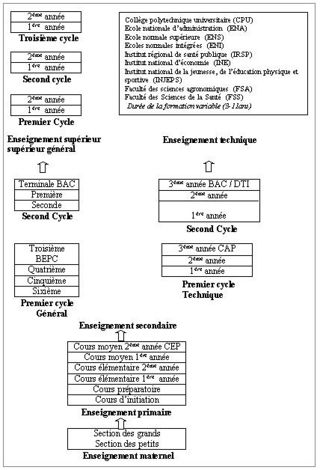Welcome to the Virtual Education Wiki ~ Open Education Wiki
Benin/OER
For entities in Benin see Category:Benin
By Graham Clarke for the Category:e-World volunteer-driven successor to Re.ViCa, updated by Cristina Brecciaroli for VISCED]; minor updates for POERUP by Paul Bacsich and James Kay
Overview
Benin (French: Bénin, formerly Dahomey), officially the Republic of Benin (French: République du Bénin), is a country in West Africa. It is bordered by Togo to the west, by Nigeria to the east and by Burkina Faso and Niger to the north. A majority of the population live on its small southern coastline on the Bight of Benin. The capital of Benin is Porto-Novo, but the seat of government is in Cotonou, the country's largest city. Benin covers an area of approximately 110,000 square kilometers (42,000 sq mi), with a population of approximately 9,050,000. Benin is a tropical, sub-Saharan nation, highly dependent on agriculture, with substantial employment and income arising from subsistence farming.
Further information
Benin was known as Dahomey until 1975.
French is the official language of Benin, but most people speak an African language. Traditional religious beliefs are professed by about 60% of the population. Islam is the religion of about 15% of the people, most of whom live in the north. Christianity, especially Roman Catholicism, is the religion of about 20%, the great majority of whom live in the south.
For a longer summary see Wikipedia or http://www.internationaleducationmedia.com/benin/
For further general information see Wikipedia:Benin/OER.
Education in Benin/OER
For a general description of education in Benin/OER see Education:Benin/OER.
(sourced from http://en.wikipedia.org/wiki/Education_in_Benin)
Education in Benin is neither free nor mandatory. In 1996, the gross primary enrollment rate was 72.5 percent, and the net primary enrollment rate was 59.3 percent. A far greater percentage of boys are enrolled in school than girls: in 1996, the gross primary enrollment rate for boys was 88.4 percent as opposed to 55.7 percent for girls; the net primary enrollment rates were 71.6 percent for boys and 46.2 percent for girls. Primary school attendance rates were unavailable for Benin as of 2001. While enrollment rates indicate a level of commitment to education, they do not always reflect children's participation in school. Because of a rapid increase in the enrollment rate, the student/teacher ratio rose from 36:1 in 1990 to 53:1 in 1997. The overall adult literacy rate is nearly 40%. Only 25% of women in Benin are literate.
School-level education
Pre-school Lasting two years, children are accepted into nurseries from ages three to four.
Primary level For those who attended pre-school, primary level can start from age five. It is mandatory from age six for everyone. Lasting six years, it is divided into three two year cycles along the following lines:
• Preparatory classes (cours d’initiation et cours préparatoire)
• Elementary classes (cours élémentaires I&II)
• Middle classes (cours moyens I&II)
Primary education culminates in a national school-leaving certificate called Certificat d’Etude Primaire (C.E.P.), and examination serving the purposes of showing completion of primary education and serving as a selection process for secondary school, which works on a priority basis.
Secondary level
Lasting seven years, and split into two cycles lasting four and three years respectively, secondary education is open from the ages 11 to 12. Core subjects are set for the first three years (junior high school), while in the fourth some are emphasised to give the students options in the Brevet Elementaire Du Premier Cycle (B.E.P.C.) exam.
In the second cycle (senior high school), studies are organised into four sections:
- Literature
- Economics
- Mathematics
- Biology
Vocational and Technical
After primary, this is the priority of the government. Private schools constitute 87% of this sector. [1] [2]
Universities in Benin
The National University of Benin (French: Université Nationale du Bénin) is the principal university in the country of Benin. The university was founded in 1970 as the Université du Dahomey. In 1975 the name was changed to Université Nationale du Bénin. Its name is abbreviated to UNB.
It is composed of 19 institutions and six campuses. The main campus is the Université d'Abomey-Calavi (UAC). Enrollment at UAC was over 16,000 in 1999, including over 3,300 women.
The University of Benin maintains ten branches:
- The Campus of Abomey Calavi
- The Faculty of Economics and Management (FASEG)
- The Faculty of Law and Political Science (FADESP)
- The Faculty of Arts and Social Science (FLASH)
- The Faculty of Science and Technology (FAST)
- The Faculty of Health Science (FSS)
- The University of Parakou (UNIPAR)
- The School of Applied Economics and Management (ENEAM)
- The National School of Administration and Prosecutor Training (ENAM)
- The Poly Technical School of Abomey Calavi (EPAC)
- The Teachers’ Training School of Porto-Novo (ENS)
- The Institute of Mathematics and Physics (IMSP)
- The Faculty Agricultural Science (FSA).
Some private higher institutions are also accredited by the Ministry of National Education. Altogether 94 higher institutions are accredited.
e-learning
ORIDEV
ORIDEV - Les Technologies de l'Information et de la Communication au service du développement. ORIDEV trains and provides Internet access at reduced prices to youth. It organizes periodical virtual meetings and Internet workshops for selected students from schools and colleges. These activities are, however, concentrated in the urban areas, particularly in Cotonou. The programmes attract pupils, students, and jobless graduates. Other courses offered by ORIDEV include MS Office applications, computer maintenance, computer networking, and Web site development. [Source: Survey of ICT and Education in Africa Volume 2: 53 Country Reports. InfoDev 2007]
Campus Numérique Francophone de Cotonou
Created by the Agence Universitaire de la Francophonie (AUF), the CNF provides a centre for researchers and students, providing them with tools and resources for training and research. [3]
